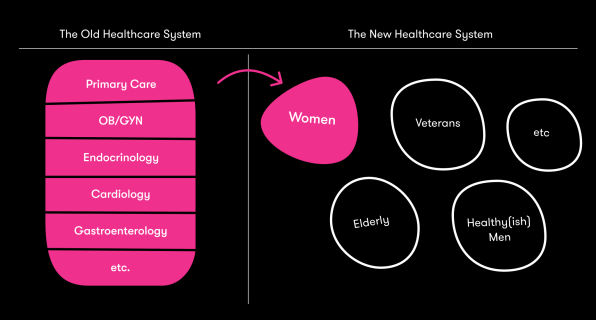This millennial women’s health brand is expanding with a controversial partner
Carolyn Witte says she’s building the future of women’s healthcare. Her company, called Tia, is a beefed up primary care clinic with gynecological services and mental healthcare that’s been called a “gynecologist for the self-care generation.” Now, it’s partnering with Catholic healthcare system CommonSpirit in order to go national. Tia doesn’t currently perform elective abortion or in vitro fertilization, two services the relationship would bar. But the partnership begs the question: Can Tia be the future of women’s healthcare if it partners with entities that actively limit women’s health choices?

[Photo: courtesy of Tia]
Tia, which Witte cofounded in 2017 with Felicity Yost, offers a blend of primary care, gynecological care, nutrition, acupuncture, and mental health services. It charges an annual fee of $150 in addition to the cost of services, the latter of which is largely covered by insurance. Its services include IUD insertion and removal, colposcopies for abnormal pap smears, myomectomies, and biopsies. The primary care practice integrates some specialty care in an effort to help women coordinate their long-term health goals as opposed to providing reactive sickness care—a shift the entire healthcare industry is currently trying to navigate. The brand’s genesis is based on the real phenomenon that women’s health concerns are often dismissed.
The company has two clinics currently, one in New York and Los Angeles, though the latter is only providing virtual care until its official opening in April. It serves 5,000 women. Witte has her eyes set on expansion: Tia raised $24 million last year to help grow its physical presence.
To reach more women, the company has signed a deal with Catholic healthcare provider CommonSpirit, which has 137 hospitals and more than 1,000 clinics and other care facilities, to co-launch more locations nationally. Through the new partnership, the two organizations will be opening a Tia clinic in Phoenix, Arizona, in the fall with the goal of opening many more locations in regions where CommonSpirit, and its sub-brand Dignity Health, have a presence. Tia will also be referring its patients to Dignity Health for care it cannot provide.

CommonSpirit is keen on joining forces with a brand-savvy clinic like Tia that has the potential to be popular with younger woman—particularly in areas with few such clinics. “Arizona historically continues to be underserved in primary care,” says Kat Rondeau, Chief Strategy Officer for the Arizona division of Dignity Health. A little more than 40% of the state’s population lives in areas with low access to primary care, mental health care, and dental care.
The company’s large footprint—and its relationship with insurance providers—make it an “ideal” partner for Tia, according to Witte. So far, Tia has been limited in its reach and growth because clinics are expensive to build. Witte wants to reach more women, even those who can’t afford the $150 annual fee, which she says the company waives for lower-income women. The real barrier to Tia providing services to less affluent women is tied up in getting more health insurers to cover its services—something that the CommonSpirit partnership could help remedy.

But joining forces with CommonSpirit is not without its drawbacks.
As a Catholic system, CommonSpirit, and its sub-brand Dignity Health, abide by the Statement of Common Values, which means it doesn’t perform “elective” abortion services or use “reproductive technology in which conception occurs outside a woman’s body” including in-vitro fertilization. A representative for CommonSpirit says that its doctors refer patients out to other clinics when they need these services. Tia, which does not currently provide abortion or fertility services, has signed the Statement of Common Values. Tia will be allowed to refer out, as it does in New York, for services it can’t provide, like obstetrics. However, which health system the clinic refers its patients to may matter. In the case of obstetrics, patients may want to know if they’re being referred to a Catholic health provider. Witte says that Tia’s providers will be sure to discuss religious affiliation before referring patients to other care facilities.
“If you end up with a pregnancy complication or miscarriage, anything where it’s very ambiguous and there’s a possibility of needing an emergency abortion or something like that, it could be a problem,” says Dr. Lori Freedman, an associate professor in the Department of Obstetrics, Gynecology, and Reproductive Sciences at the University of California San Francisco Medical Center who studies Catholic Health systems. She says that in a survey she conducted, 40% of women did not know their healthcare provider was Catholic, which is not surprising given that these faith-based health systems don’t necessarily advertise their ethical and religious directives.
However, those directives most certainly impact care. In 2019, some 1,500 medical professionals and staff affiliated with the University of California San Francisco Medical Center petitioned against the health system deepening its relationship with Dignity Health. The expanded partnership would have meant that UCSF doctors would have been working at some of Dignity Health’s hospitals. Their main concerns were over how agreeing to the organization’s rules would impact their ability to render care to patients (an idea that is supported by research). They feared working with Dignity Health would affect contraceptive care (including tubal ligation), abortion care, fertility care, and gender affirming surgeries. “We believe the religious policies that govern care at Dignity and CHI hospitals are in direct conflict with key principles of UCSF and UCSF Health,” they wrote. In the end, the health system’s administrators decided against the expanded partnership.
Catholic health systems may be loosening some of these restrictions. “Dignity Health’s Catholic and non-Catholic care sites always provide medically necessary care for any patient, including pregnant women. That includes providing care that would result in the termination of a pregnancy. The determination is made by the patient’s physician,” a representative for Dignity Health said. Dignity Health’s Catholic-sponsored hospitals offer primary and specialty care for transgender patients, including hormone therapy and some surgical procedures. It also offers birth control, though it does not provide “elective sterilization” including hysterectomies and vasectomies to any patient.

Witte says she doesn’t believe that CommonSpirit will encroach on how Tia delivers care. “Everything is controlled by Tia and as a result of that we have total control over the practice of medicine,” she says, adding that the company at its core wants to provide women with choices.
In the past, Witte has said she would be interested in providing abortion care. “We will do abortion, and when we do it, we’re going to do it in the best way, which means absolutely providing medication abortion, but hopefully getting into surgery as well,” she told The Cut in early 2019. But when I asked her recently about Tia’s plans to introduce abortion care since it’s such an important aspect of women’s health, she offered a more cautious response: “Tia is really focused on the model that we’re doing today. When and how we expand our scope of practice is always a question for Tia and one that I think we need to approach on a state by state basis.”
In short, abortion position on the company’s road map is now in question. There are a lot of reasons why that might be the case. Setting up abortion care, particularly surgical care, is difficult. So are the safety measures that a clinic would have to employ due to the political vitriol that surrounds the procedure. On top of that, some landlords put in their contracts that health providers using their buildings can’t provide abortions. These are exactly the reasons why many gynecologists’ offices don’t offer these services.
The politics of women’s health
Women’s health encompasses far more than abortion. But the abortion debate isn’t just about the procedure itself: It’s about how much choice women ultimately have in making their own healthcare decisions. One of the biggest frustrations in women’s health is that it is often compartmentalized into little boxes of specialty care, and abortion is a part of that trend. It exists outside of comprehensive women’s healthcare, when in fact it is very much wrapped up in it. As an example, the drugs mifepristone and misoprostol, frequently identified as “medication abortion,” can also be used to treat women who are experiencing a missed miscarriage, wherein a woman miscarries, but the tissue does not expel. Restrictions on these drugs make it difficult for women who are not seeking abortions to access them. Studies have repeatedly shown those drugs are safe, which means those obstructions are entirely political.
Politics also has a big impact on how women receive care. In Arizona, where Tia will have its first joint clinic with CommonSpirit, there are new anti-abortion bills on the table. The state already has limitations on abortion, requiring women to get an ultrasound and wait 24 hours before having the procedure done. There are also restrictions on insurance coverage: Insurance on the state health exchange can only cover abortion if the patient’s life is endangered, and the same goes for public employees. Meanwhile, Medicaid cannot cover abortion for any reason. The state senate recently approved a bill that would prevent a woman from seeking an abortion if the fetus has genetic abnormalities, like Down’s Syndrome, suggesting there may be more constraints to come. Furthermore, there are dwindling options in Arizona for women seeking abortion care. As of 2017, there were only 11 clinics providing that care, according to Guttmacher Institute.
Catholic health systems also don’t just limit abortion. They limit fertility choices. Freedman notes that studies have found that women of color are more likely to receive healthcare at Catholic hospitals than white women and as a result are more commonly the recipients of restricted care. As Catholic health systems grow and partner with an increasing number of non-Catholic health systems, the more opportunity these systems have to control women’s health choices. “Do they have choices? Are there other places they could go? Would they want to go? Or are they there because the Catholic healthcare sector has grown to this extent that this is the only option in some communities?” says Freedman.
I asked Witte whether she had considered these factors when choosing a partner, especially as the company enters a market that is actively restricting women’s health options.
“Whether you live in a red state or a blue state, you need comprehensive women’s healthcare,” says Witte. “I think it would be shortsighted to say, Tia is only going to enter markets that are aligned with us politically or philosophically.”
Of course, Tia doesn’t have to only enter markets where it is politically aligned to stick by its values of supporting women’s choices. Planned Parenthood, which serves millions of women, has been in operation for more than 100 years, and survived government attempts to defund it, also operates in Arizona. There are obvious differences between these two entities. What sticks out, is that is that one of them is willing to wade into the political fray to ensure that it can continue to provide women’s health services and the other is not.
Update 4/2/2021 This story has been updated with a statement from Dignity Health.
(38)



